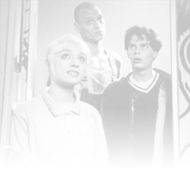 |
 |
| WHAT SUNDANCE WROTE: |
|
|
|||||||||||
 |
|||||||||||
| REVIEW BY DENNIS HARVEY: | |
| |
Less
a commentary on German skinhead society than a conflicted youths drama
without much hair, Oi! WARNING reps a highly accomplished, sometimes electrifying
feature debut for cohelmers Dominik and Benjamin Reding (...). Stylistic bravado announces itself straight off, with a dream sequence in which protag Janosch (Sascha Backhaus) imagines his sinewy skin pal Koma (Simon Goerts) and latter's spouse, Sandra (Sandra Borgmann), making love in a forest ó and one suspects Janosch would prefer to take her place. Waking up, he abandons home and a fretting mother to join the couple, bunking in a bizarrely decorated nursery soon to be inhabited by expected twin infants. Sandra is not thrilled by this new arrangement; she's already had it up to here with the boys-club atmosphere of skinhead society, wherein sidelined girlfriends already look like the depressed hausfraus they'll soon become. But Janosch's stuporous admiration of Koma ó who defines himself by his ready-and-willingness to scrap ó is well received, with a sublimated mutual carnal frisson. Janosch promptly loses his locks, gets a brewery job alongside his idol and reluctantly enrolls in a local school. For her own reasons, Sandra "gives" him a girlfriend (Britta Dirks), one who's eager to domesticate Janosch as he is to explore opposing avenues. During a quarry-pond outing, Koma picks a nasty fight with a punk. This has far-reaching consequences, especially once Janosch discovers a parallel, less sexually constricted network of heavily pierced, tattooed "modern primitives". He gets physical with one (Jens Veith), a development that does not escape Komaís notice. Climactic violent confrontation is terse and startling. Often very funny as well as edgy, Oi! WARNING doesn't try to psychoanalyze its characters, instead creating a workable emotional logic through the sheer aggression, mercurial mood shifts and kinetic firepower (often quick-cutting between locations/actions) of its atmosphere. (...) Pic doesn't comment specifically on the racism, homophobia and Nazi-sympathizing often associated with skinhead scenes, nor does it reveal whether Koma and his mates share any of those dogmas. Their anarchic nihilism seems an engine in itself. Never less than striking to look at, the film has a hyper-real, fevered tone that at times recalls influences from Kenneth Anger to Fassbinder, but always finds the brothers Reding in bold control of their vision (...)
|
|
|
Just expelled from school, Janosch trashes his mother's book- filled house and sets out on his scooter to find his older pal, Koma, who has moved to the town of Dortmund. Tall, muscular, and violent, Koma works at a menial job in a beer-bottling factory by day. By night he is a star of the skinhead scene: kick-boxer, singer, all-round beer drinker, and street brawler. And after a night of carousing and fighting, he returns to his well-ordered apartment and Sandra, a pretty, pregnant, peroxide blond. Janosch moves in with Koma, and as he tries to fit in with his new family, comes to shave his head, starts drinking and brawling with the skins, acquires a girlfriend, and loses his virginity. But soon there is trouble in paradise. The punks confront the skins, and Koma's secret hideout in the woods is destroyed. And when Janosch goes to get a tattoo from Zottel, a gentle, longhaired, fire-eating hippie, emotional forces are set in motion which lead to the shocking climax. Shot in superbly artistic black-and-white photography, Oi!WARNING combines action, image, and a perfect ear for dialogue in a powerful study of skinhead subculture, male tribal violence, and the instability of the male character as it matures from adolescent to adult: sexual tension, possible excursions into homoeroticism, need for acceptance, and drive for a distinctive identity. Also remarkable is the insightful contrast the film draws between male and female desires. Oi! WARNING is a stunning feature-film debut for its young codirectors, Dominik and Benjamin Reding. Nicole Guillemet, Sundance-Filmfestival
|
|||||